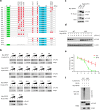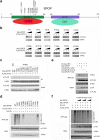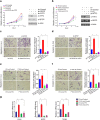SPOP promotes ATF2 ubiquitination and degradation to suppress prostate cancer progression
- PMID: 29996942
- PMCID: PMC6042370
- DOI: 10.1186/s13046-018-0809-0
SPOP promotes ATF2 ubiquitination and degradation to suppress prostate cancer progression
Abstract
Background: Next-generation sequencing of the exome and genome of prostate cancers has identified numerous genetic alterations. SPOP (Speckle-type POZ Protein) is one of the most frequently mutated genes in primary prostate cancer, suggesting that SPOP may be a potential driver of prostate cancer. The aim of this work was to investigate how SPOP mutations contribute to prostate cancer development and progression.
Methods: To identify molecular mediators of the tumor suppressive function of SPOP, we performed a yeast two-hybrid screen in a HeLa cDNA library using the full-length SPOP as bait. Immunoprecipitation and Western Blotting were used to analyze the interaction between SPOP and ATF2. Cell migration and invasion were determined by Transwell assays. Immunohistochemistry were used to analyze protein levels in patients' tumor samples.
Results: Here we identified ATF2 as a bona fide substrate of the SPOP-CUL3-RBX1 E3 ubiquitin ligase complex. SPOP recognizes multiple Ser/Thr (S/T)-rich degrons in ATF2 and triggers ATF2 degradation via the ubiquitin-proteasome pathway. Strikingly, prostate cancer-associated mutants of SPOP are defective in promoting ATF2 degradation in prostate cancer cells and contribute to facilitating prostate cancer cell proliferation, migration and invasion.
Conclusion: SPOP promotes ATF2 ubiquitination and degradation, and ATF2 is an important mediator of SPOP inactivation-induced cell proliferation, migration and invasion.
Keywords: ATF2; Prostate cancer; Proteasomal degradation; SPOP; Ubiquitination.
Conflict of interest statement
Ethics approval and consent to participate
The study was approved by the ethics committee of the Fudan University Shanghai Cancer Center and signed informed consent was obtained from each patient.
Consent for publication
All the authors have read and approved the manuscript.
Competing interests
The authors declare that they have no competing interests.
Publisher’s Note
Springer Nature remains neutral with regard to jurisdictional claims in published maps and institutional affiliations.
Figures






References
MeSH terms
Substances
Grants and funding
LinkOut - more resources
Full Text Sources
Other Literature Sources
Medical

